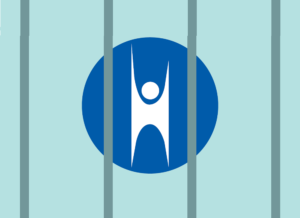INSIDE THE WALLS | First Humanist Chaplain in North Carolina Prison

Through the American Humanist Association’s Humanism For All program, I regularly correspond with incarcerated people eager to learn about humanism (especially from our online studies), connect with individuals and groups in the movement, and form a humanist chapter at their facility. I also communicate with facility staff and volunteers to ensure our materials are accessible despite increased security measures. And I recently had the pleasure of coordinating with Elisa Rosoff—the first ever Humanist-endorsed chaplain to work inside a North Carolina prison—to offer humanist programming at Arise Collective, formerly known as Interfaith Prison Ministry for Women.
I met Rosoff in 2021 when she became a Humanist Chaplain, endorsed by The Humanist Society, and an Associate Board-Certified Chaplain through the Board of Chaplaincy Certification, Inc (BCCI). She already held a Master of Education in Early Childhood and Special Education and was a teacher in Washington, D.C., and New York City. Inspired by her grandparents—who were both students of world religions and classical philosophy at Union Theological Seminary, Civil Rights activists, and counselors with a deep appreciation and understanding of psychology and the natural world—Rosoff also enrolled in Union Theological Seminary (UTS) in 2018 to get a Master of Divinity in Psychology and Religion.
“I grew up in an interfaith, intercultural family,” said Rosoff. “My dad is Jewish (culturally, not religiously, per se) and my mother is Christian with a deep sense of spirituality and veneration for the natural world… I also had friends from around the world who identify with a diverse array of religious and philosophical groups.” When Rosoff had to choose a “faith group” to become a clinical professional chaplain through BCCI, humanism made sense, given her deep connection to the Humanist Manifesto III and Ten Commitments. She understands humanism as a philosophy that emphasizes the importance of compassionately addressing human needs in the here and now without involving a deity or relying on an afterlife, while still respecting people who do.
Many experiences led Rosoff to her current prison work. In high school, she heard a talk by Equal Justice Initiative founder Bryan Stevenson that educated her on prison life and the obstacles people face when re-entering society; while taking her first unit of clinical pastoral education, she learned that prison re-entry was an available area of focus for her degree; after reading “The New Jim Crow” by Michelle Alexander, she became interested in learning more about incarceration first-hand; and while assigned to Exodus Transitional Community in East Harlem as a “prison re-entry chaplain intern,” she discovered the importance of being a consistent, non-judgmental presence. “Though I have been a chaplain in other settings—such as large hospitals and churches—I am especially drawn to prison chaplaincy because of my belief that transformation is always possible and because incarcerated individuals in this society are often regarded as less-than [human], or ‘lost causes’ and a ‘burden to society,'” said Rosoff. “I know that is not true and aim to treat incarcerated individuals with the dignity and respect they are worthy of by simply being human beings.” She also hopes society will break away from assumptions about addiction and mental health to more fully see incarcerated people and understand that hardly anyone makes decisions lightly that go against their morals and values.
As a “Community-Funded Chaplain” with Arise Collective, Rosoff connects with women inside the prison, and then, if they are accepted into the Women’s Re-entry Project, she works with them as they navigate their reentry into society. She provides re-entry residents with spiritual and/or emotional care while also offering programming such as grief counseling, yoga-inspired movement classes, meditative garden walks, tea time, and more. She also supports women at the facility with life sentences as their care needs might look different without the hope of release. Oftentimes sessions allow residents to vent to her about their frustrations instead of letting their anger build up and come out in harmful ways. Sometimes, Rosoff will follow up on sessions by sharing resources related to the women’s interests. “I personally have been well-supported (both at the state level and at the prison where I work) and granted time to engage prison residents with humanist programming and interact one-on-one with residents in an equal capacity as Christian chaplains.” For humanist group activities, she enjoys providing documents and courses, discussion questions, music, poetry, chair yoga, and meditation (awareness of breath).
Rosoff would love to see and network with more humanist chaplains at prison facilities so all incarcerated people are able to access the care and support they need. “We are all worthy of love, respect, and compassion, regardless of our personal beliefs about how the world works.”
